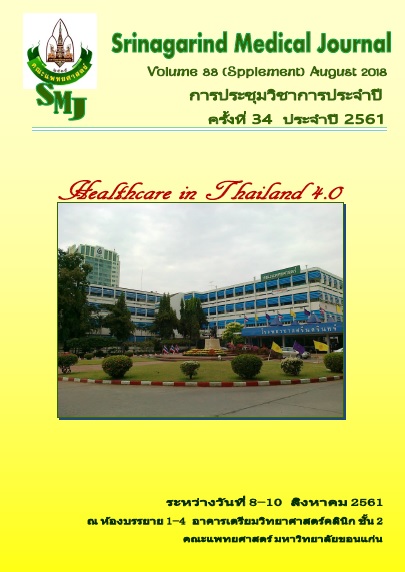Knowledge, Health Beliefs and Practices on the Prevention and Control of Influenza among Grade 12 High School Students in Khon Kaen Province
Keywords:
Knowledge; health belief; health practices; influenza; high school student; ความรู้; ความเชื่อด้านสุขภาพ; การปฏิบัติตน; นักเรียนชั้นมัธยมศึกษาปีที่ 6; โรคไข้หวัดใหญ่Abstract
Background and Objectives: Seasonal influenza is one of the epidemiology surveillance diseases, and is responsible for seasonal flu epidemics each year, most common in the winter season especially in school and in the age group of 15-24 years students. From the literature review, we also found that there is a great amount of high school students with lack of knowledge about influenza prevention and control. This leads to the study of knowledge, health beliefs and practices on the prevention and control of influenza among high school students. Moreover, to study their relationships with sex, GPA and sources of information about influenza.
Methods: A descriptive study in the study population 200, with the sample size of 142 grade 12 high school students were sampled using cluster sampling. Paper based questionnaires were applied for data collection. Statistical analysis was performed by SPSS v. 19.0 using proportion, mean, median, standard deviation, minimum and maximum and inferential statistic using Odds ratio, 95% confidence interval,
p-value and Pearson correlation.
Results: The overall response rate was 79.0%. The results showed that 24.7% of students had the level of knowledge above the standard level (95%CI 17.03-34.22), 51.3% of the students’ level of health beliefs were low. Whereas 50.0% of the students’ level of practices on the prevention and control of epidemic influenza were high. Amount of female’s level of knowledge above standard level was significantly higher than male, Students with source of knowledge from parents had higher level of knowledge and practice than others, GPA affect the level health beliefs significantly.
Conclusion: Most of the students’ knowledge regarding influenza are below the standard and the level of health beliefs are also below average. But the students’ level of practices on the prevention and control of pandemic influenza are above average. Students with source of knowledge from parents has significantly higher level of knowledge and practice than others.




